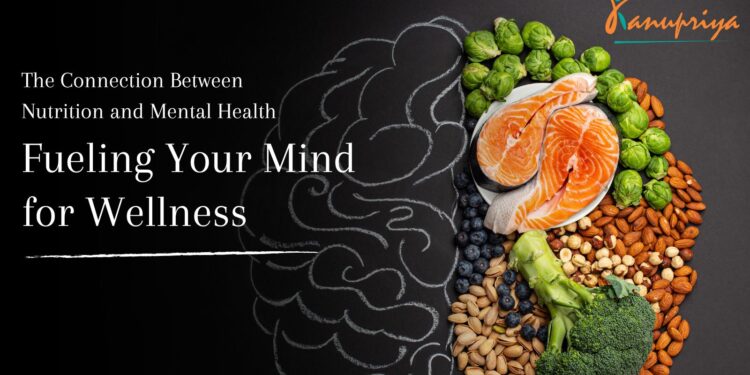In recent years, the link between nutrition and physical health has been well-documented. But did you know that what you eat also has a profound impact on your mental health? Emerging research highlights that the food we consume can influence mood, cognitive function, and overall emotional well-being.
As a nutrition counseling practice, I am passionate about helping you harness the power of food to not only fuel your body but also nourish your mind. Let’s explore the fascinating connection between nutrition and mental health and practical steps you can take to optimize your diet for emotional wellness.
The Science Behind Food and Mood
Your brain is a highly active organ, constantly working to process thoughts, emotions, and bodily functions. To do this efficiently, it relies on a steady supply of nutrients. Here’s how nutrition plays a role:
- Nutrient Deficiencies and Mental Health:
- Low levels of vitamins and minerals like B vitamins, iron, and omega-3 fatty acids have been linked to depression, anxiety, and cognitive decline.
- Poor diets high in processed foods and refined sugars can increase inflammation, which has been associated with mental health disorders.
- The Gut-Brain Connection:
- Your gut and brain communicate through a network known as the gut-brain axis. A healthy gut microbiome (the community of bacteria in your digestive system) supports the production of mood-regulating neurotransmitters like serotonin and dopamine.
- Fibre-rich foods and probiotics can improve gut health, which in turn positively impacts mental well-being.
- Blood Sugar Balance:
- Fluctuating blood sugar levels can lead to mood swings, fatigue, and irritability. Eating balanced meals with a mix of protein, healthy fats, and complex carbohydrates can help stabilize energy and mood.
Key Nutrients for Mental Health
- Omega-3 Fatty Acids
Found in fatty fish (like salmon and mackerel), walnuts, and flaxseeds, omega-3s support brain function and have been shown to reduce symptoms of depression and anxiety. - B Vitamins
B vitamins, particularly B6, B12, and folate, are essential for energy production and neurotransmitter synthesis. Sources include leafy greens, eggs, lean meats, and fortified cereals. - Magnesium
Magnesium helps regulate stress and supports relaxation. Foods like spinach, almonds, and dark chocolate are excellent sources. - Vitamin D
Known as the “sunshine vitamin,” low levels of vitamin D have been linked to seasonal affective disorder (SAD) and depression. Get it through sunlight exposure, fortified foods, or supplements. - Antioxidants
Fruits and vegetables rich in vitamins C and E (like berries, oranges, and nuts) combat oxidative stress, which can negatively impact mental health.
Foods That Support Mental Wellness
- Leafy Greens: Packed with folate, magnesium, and antioxidants to reduce inflammation.
- Whole Grains: Complex carbs like quinoa, oats, and brown rice provide a steady release of energy and support serotonin production.
- Fermented Foods: Yogurt, kimchi, sauerkraut, and kefir promote a healthy gut microbiome.
- Lean Proteins: Chicken, fish, eggs, and beans provide amino acids essential for neurotransmitter production.
- Colorful Fruits and Vegetables: A variety of colors ensures a wide range of nutrients for brain health.
What to Avoid
- Highly Processed Foods: These are often low in nutrients and high in unhealthy fats and sugars, which can contribute to inflammation.
- Sugary Snacks and Drinks: Rapid spikes and crashes in blood sugar can impact mood and energy levels.
- Excessive Caffeine: While moderate caffeine can boost alertness, too much can increase anxiety and disrupt sleep.
Practical Tips for a Diet-Mental Health Connection
- Meal Planning: Plan balanced meals and snacks to ensure you’re getting a variety of nutrients.
- Stay Hydrated: Even mild dehydration can impact mood and cognitive function.
- Mindful Eating: Pay attention to how certain foods make you feel and adjust your diet accordingly.
- Limit Alcohol: Alcohol can disrupt sleep and exacerbate feelings of depression or anxiety.
The Role of Personalized Nutrition
Every individual is unique, and so are their nutritional needs. If you’re experiencing mental health challenges, consulting a nutrition counselor can help you develop a personalized plan that complements your emotional wellness journey.
Your Mental Health Matters
What you eat is a powerful tool for improving your mental health. By choosing nutrient-rich foods, supporting your gut health, and stabilizing your blood sugar, you can create a strong foundation for emotional well-being. If you’re ready to explore the connection between nutrition and mental health further, my practice is here to guide you every step of the way.
Let’s work together to nourish your mind and body for a happier, healthier you.
Your Nutrition Counseling Practice
Helping you achieve balance and wellness, one meal at a time.
Top of Form
Bottom of Form








